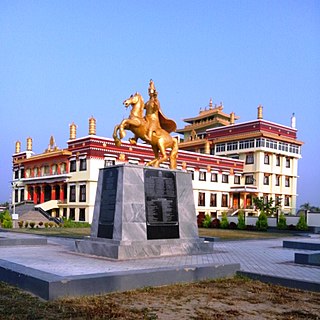Related Research Articles

The United Nations General Assembly is one of the six principal organs of the United Nations (UN), serving as its main deliberative, policymaking, and representative organ. Currently in its 77th session, its powers, composition, functions, and procedures are set out in Chapter IV of the United Nations Charter. The UNGA is responsible for the UN budget, appointing the non-permanent members to the Security Council, appointing the UN secretary-general, receiving reports from other parts of the UN system, and making recommendations through resolutions. It also establishes numerous subsidiary organs to advance or assist in its broad mandate. The UNGA is the only UN organ where all member states have equal representation.
The United Nations Commission on Human Rights (UNCHR) was a functional commission within the overall framework of the United Nations from 1946 until it was replaced by the United Nations Human Rights Council in 2006. It was a subsidiary body of the UN Economic and Social Council (ECOSOC), and was also assisted in its work by the Office of the United Nations High Commissioner for Human Rights (UNOHCHR). It was the UN's principal mechanism and international forum concerned with the promotion and protection of human rights.

The Charter of the United Nations (UN) is the foundational treaty of the United Nations, an intergovernmental organization. It establishes the purposes, governing structure, and overall framework of the UN system, including its six principal organs: the Secretariat, the General Assembly, the Security Council, the Economic and Social Council, the International Court of Justice, and the Trusteeship Council.

The International Covenant on Civil and Political Rights (ICCPR) is a multilateral treaty that commits nations to respect the civil and political rights of individuals, including the right to life, freedom of religion, freedom of speech, freedom of assembly, electoral rights and rights to due process and a fair trial. It was adopted by United Nations General Assembly Resolution 2200A (XXI) on 16 December 1966 and entered into force on 23 March 1976 after its thirty-fifth ratification or accession. As of June 2022, the Covenant has 173 parties and six more signatories without ratification, most notably the People's Republic of China and Cuba; North Korea is the only state that has tried to withdraw.
A United Nations General Assembly resolution is a decision or declaration voted on by all member states of the United Nations in the General Assembly.

The United Nations Human Rights Council (UNHRC) is a United Nations body whose mission is to promote and protect human rights around the world. The Council has 47 members elected for staggered three-year terms on a regional group basis. The headquarters of the Council are at the United Nations Office at Geneva in Switzerland.
The Vienna Declaration and Programme of Action (VDPA) is a human rights declaration adopted by consensus at the World Conference on Human Rights on 25 June 1993 in Vienna, Austria. The position of United Nations High Commissioner for Human Rights was recommended by this Declaration and subsequently created by General Assembly Resolution 48/141.
The Declaration on the Granting of Independence to Colonial Countries and Peoples, also known as the United Nations General Assembly Resolution 1514, was a resolution of the United Nations General Assembly during its fifteenth session, that affirmed independence for countries and peoples under colonial rule.
The Tibetan sovereignty debate refers to two political debates. The first political debate is about whether or not the various territories which are within the People's Republic of China (PRC) that are claimed as political Tibet should separate themselves from China and become a new sovereign state. Many of the points in this political debate rest on the points which are within the second historical debate, about whether Tibet was independent or subordinate to China during certain periods of its recent history.

Discussions of LGBT rights at the United Nations have included resolutions and joint statements in the United Nations General Assembly and the United Nations Human Rights Council (UNHRC), attention to the expert-led human rights mechanisms, as well as by the UN Agencies.
The Brazilian resolution was presented to the Economic and Social Council of the United Nations in 2003. The resolution covered human rights and sexual orientation. E/CN.4/2003/L.92* It came under the Commission on Human Rights, fifty-ninth session, item 17 on the agenda.

The Tibetan diaspora are the diaspora of Tibetan people living outside Tibet.
Defamation of religion is an issue that was repeatedly addressed by some member states of the United Nations (UN) from 1999 until 2010. Several non-binding resolutions were voted on and accepted by the UN condemning "defamation of religion". The motions, sponsored on behalf of the Organization of the Islamic Conference (OIC), now known as the Organisation of Islamic Cooperation, sought to prohibit expression that would "fuel discrimination, extremism and misperception leading to polarization and fragmentation with dangerous unintended and unforeseen consequences". Religious groups, human rights activists, free-speech activists, and several countries in the West condemned the resolutions arguing they amounted to an international blasphemy law. Critics of the resolutions, including human rights groups, argued that they were used to politically strengthen domestic anti-blasphemy and religious defamation laws, which are used to imprison journalists, students and other peaceful political dissidents.

Tibet Justice Center, is an American legal association founded in 1989 that advocates human rights and self-determination for the Tibetan people.

United Nations General Assembly Resolution 62/167, titled "Situation of Human Rights in the Democratic People's Republic of Korea", is a resolution of the United Nations General Assembly about the situation in North Korea, which was adopted on December 18, 2007 at the 62nd session of the General Assembly. In the resolution, the United Nations General Assembly expresses serious concern at the persistence of the systematic, widespread and grave violations of human rights in North Korea, urging the Government of North Korea to respect fully all human rights and fundamental freedoms.

UN General Assembly Resolution 60/147, the Basic Principles and Guidelines on the Right to a Remedy and Reparation for Victims of Gross Violations of International Human Rights Law and Serious Violations of International Humanitarian Law, is a United Nations Resolution about the rights of victims of international crimes. It was adopted by the General Assembly on 16 December 2005 in its 60th session. According to the preamble, the purpose of the Resolution is to assist victims and their representatives to remedial relief and to guide and encourage States in the implementation of public policies on reparations.

The General Debate of the sixty-fifth session of the United Nations General Assembly was the first debate of the 65th Session of the General Assembly that ran from 23 – 29 September 2010. Leaders from Member States addressed the General Assembly.
The Declaration on the Rights of Peasants is an UNGA resolution on human rights with "universal understanding", adopted by the United Nations in 2018. The resolution was passed by a vote of 121-8, with 54 members abstaining.
The 1973 United Nations International Convention on the Suppression and Punishment of the Crime of Apartheid was the first binding international treaty which declared the crime of apartheid and racial segregation under international law. It was adopted by the General Assembly on 30 November 1973 and came into force on 18 July 1976. It passed by 91 votes in favor, four against and 26 abstentions. 110 countries are currently parties to the convention, with 26 signatories.

The eleventh emergency special session of the United Nations General Assembly opened on 28 February 2022 at the United Nations headquarters. It addresses the Russian invasion of Ukraine. Maldivian politician Abdulla Shahid served as President of the body during this time.